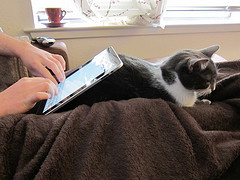DOJ Proposal: Apple Must Let Amazon, Barnes & Noble Sell E-Books Through iOS Apps
For those coming late to this party, let’s recap. The DOJ sued Apple and six publishers — Random House, Hachette Book Group, HarperCollins Publishers, Macmillan, Penguin and Simon & Schuster (Random House eventually became part of Penguin, bringing the total of publishers to five) — alleging that the computer company and these book biggies had colluded to change the e-book pricing model for the industry to give themselves a leg-up over e-book market leader Amazon.
At the time of the collusion, Apple was introducing the iPad and its online bookstore. It could not afford to beat Amazon in a price war. Meanwhile, publishers were tired of Amazon demanding significantly deeper discounts than other booksellers, thus hurting their profits in an industry that is not terribly profitable. Thus, the idea was put forth by Apple to change from the longstanding publishing standard, in which the bookseller pays a wholesale price (usually 40-55% of the retail price) and then determines its own retail price, to the so-called “agency model,” in which the publisher determines the retail price and the reseller gets a fixed percentage.
While this allowed Apple to chip away at Amazon’s market share, and gave publishers larger profits in the growing e-book market, it also resulted in publishers charging more for e-books than what customers would pay for printed books. It was especially problematic with sets of books, where publishers rarely offered discounts when purchasing an entire series of books. So while customers could buy a slipcased set of the first four Song of Ice and Fire books in paperback for $20, that same set would cost $36 because each title was priced individually.
The publishers in the case all eventually settled in the matter (though none have actually admitted their part in price-fixing), but Apple went all the way to trial, where company executives only helped to make the DOJ’s case, admitting that e-book prices rose as a result of the switch to agency pricing.
In July, the court ruled against Apple, which said at the time that it planned to appeal.
“The evidence is overwhelming that Apple knew of the unlawful aims of the conspiracy and joined the conspiracy with the specific intent to help it succeed,” wrote the judge in the case.
And so the DOJ has filed its first proposed remedies [PDF] that would put an end to the case and let everyone get back to selling e-books already. The remedies would require the court’s approval
In addition to allowing Apple and Barnes & Noble to open up e-book purchasing through their iOS apps (for which the two booksellers would not pay commission or fees to Apple for two years), the proposal requires that Apple cancel its existing e-book deals with the defendant publishers and refrain for five years from entering into new e-book distribution deals that would attempt to remove competition from the e-book pricing market.
The DOJ also wants Apple to not use its substantial leverage in the downloadable music/movies/TV market to convince content providers to raise the prices they charge to Apple’s competition (thus raising prices to the consumer).
If approved by the court, an external monitor would be appointed to keep tabs on Apple’s compliance with these remedies.
“Under the department’s proposed order, Apple’s illegal conduct will cease and Apple and its senior executives will be prevented from conspiring to thwart competition in the future,” explains Bill Baer, Assistant Attorney General in charge of the Department of Justice’s Antitrust Division.
Want more consumer news? Visit our parent organization, Consumer Reports, for the latest on scams, recalls, and other consumer issues.


